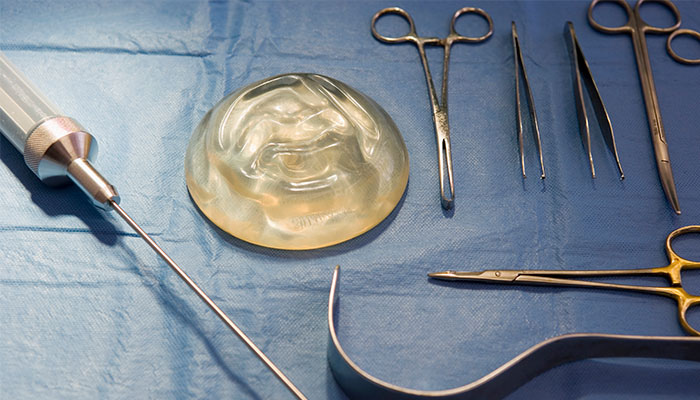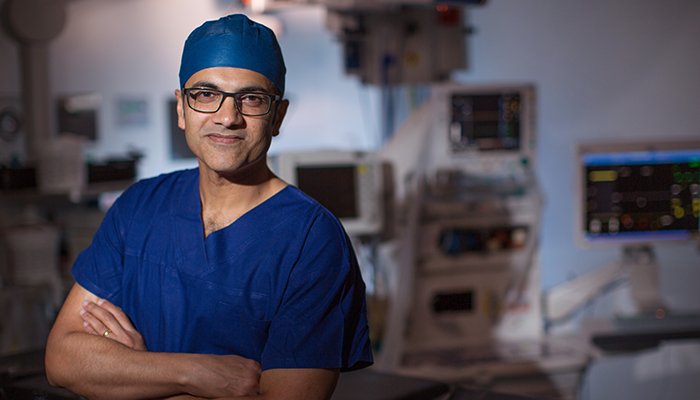A Macquarie University study of breast implants gone wrong has found that patients with complications occurring within five years of implantation were twice as likely to have used non-certified surgeons.
The study, published in the latest Aesthetic Surgery Journal and co-authored by surgeon Professor Anand Deva, analysed data from a survey of more than 600 women who attended the Breast Implant Clinic at Macquarie University in 2018.
Patients who came to the clinic, which Deva describes as a world-first, had lived with their implant for an average of 11 years and had an average age of 42. The study showed that most experienced breast pain and/or a problem with the implant and the most common complication was capsular contracture, affecting more than 90 per cent of clinic patients.
"Capsular contracture is where the shell of the implant becomes creased or folded instead of sitting smoothly within the body, and then contracts and becomes hardened," says Professor Anand Deva, who is Head of Cosmetic, Plastic and Reconstructive Surgery at Macquarie University.
Visible deformities were also common, with almost a third of patients having the 'waterfall deformity,' where breast tissue can sag over the implant, and about one in eight patients having 'double bubble' where the implant is displaced, slipping below the breast.
Patients have poor awareness of risks
Deva says the data was collected from more than 600 women who gave their consent for researchers to gather useful data about adverse events following breast implant surgery.
He says there was 'poor awareness universally' about the risks of breast implants among patients.
"Many patients were also told not to have recommended cancer screening mammograms following breast implant surgery, which is incorrect," says Deva.
"One thing that stood out is that procedures by certified plastic surgeons carried a significantly lower risk of 'double bubble' and 'waterfall' complications, which can involve implant malposition and deformity," he says.
More than half the implants in women attending the clinic who had cosmetic procedures in Australia were inserted by doctors who were not qualified specialists, having either general medical registration or general practice registration.
Profit-driven clinics
Deva says the breast assessment clinic also revealed some concerning data about a subset of medical practitioners who had worked at the now-defunct cut-price breast implant clinic chain, The Cosmetic Institute – the subject of a current class action.
Our data also shows that there are still a lot of cowboys out there, and that better regulation of elective cosmetic procedures is necessary.
Most of these doctors only held Australian Health Practitioner Regulation Agency (AHPRA) general registration, and had not completed any specialist training after their internship and residency.
"The lack of recognised surgical training and relative lack of experience by unqualified practitioners probably contributed to poor outcomes for many patients subject to invasive surgery," says Deva.
One in five women attending the breast assessment clinic had travelled overseas to get breast implants in 'fly-in, fly-out' discounted arrangements where patients may only meet their surgeon just before their pre-paid operation, by which stage 'fully informed patient consent' is less likely.
Australian research into medical tourism for breast implant surgery has shown that complications are common, and range from wound infection to serious outcomes including sepsis, radical mastectomy, brain injury and death.
Patients who return from overseas surgery with problems can also burden the Australian health system with the cost of treating these complications, Deva says.
No lifetime guarantee
Breast augmentation is the most common elective plastic surgery performed in the world after liposuction.

Risks: Many women had not received adequate information about breast implant surgery, Deva's data analysis found.
About 73 per cent of the 65,000 breast implant patients recorded in the Australian Breast Device Registry (ABDR) between 2012 and 2020 had surgery for cosmetic reasons, with the rest being post-cancer and other medical reconstruction. About a quarter of these cosmetic procedures involved surgery to correct or remove breast implants.
Deva says the ABDR was established in 2012 to record all breast implants and implant revision surgery in Australian women, following a series of crises around breast implant safety.
These included the failure of French company Poly Implant Prothese (PIP), which sold more than 300,000 implants containing poor-quality silicon, and had nearly 1000 cases of breast implant-associated anaplastic large cell lymphoma (BIA-ALCL) reported globally.
"The registry meant that for the first time, we could understand the performance of these devices," he says – but adds the registry doesn't include the significant portion of implants now done overseas.
Revision surgery is common
After nine years, the registry shows that an increasing proportion of women with implants are undergoing revision surgeries.
Deva says most first-generation implants from the 1960s lasted just a few years and their thin shells often contracted and ruptured, but today's 'fifth generation' of implants have more robust shells.
But while many breast implant manufacturers promise a lifetime warranty, Deva warns these guarantees have many loopholes and capsular contracture – the most common defect – is not covered.
"Our experience suggests that most implants fail over time, not just from device failure, but also from changes to the breast structure through breastfeeding, ageing, menopause – just general wear and tear," he says.
"After around 10 years, there's a slow and steady accumulation of problems that will eventually require the implant to be removed or replaced."
Deva says that the Macquarie University breast implant assessment clinic provides a useful service where women can have their implants reviewed regularly, and there's a need for similar services to be established more widely.
"Our data also shows that there are still a lot of cowboys out there, and that better regulation of elective cosmetic procedures is necessary," he says.

Anand Deva , pictured, is the Director of Cosmetic, Plastic and Reconstructive Surgery at the Faculty of Medicine and Health Sciences, Macquarie University. The MQ Health Integrated Breast Implant Clinic is located within a world-class state-of-the-art medical precinct at Macquarie University.






